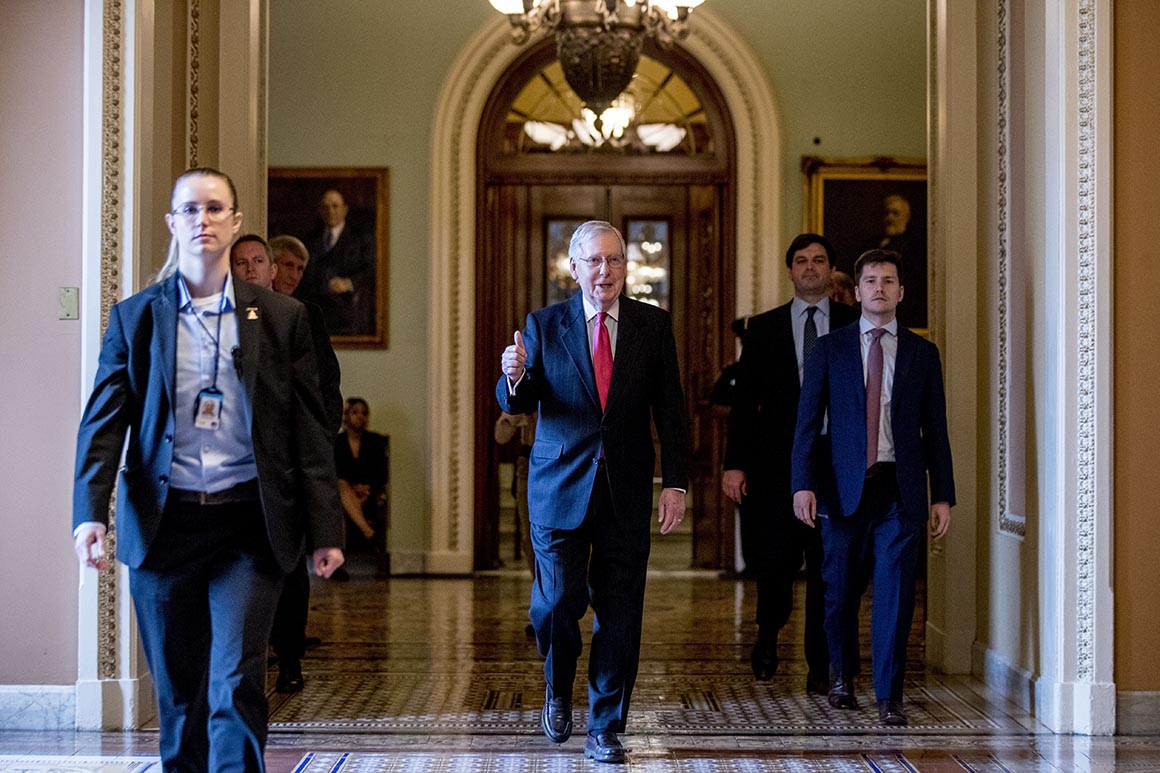
“The Senate has pivoted from one of the most contentious, partisan periods in the nation’s history to passing this rescue package 100 to nothing all in one quarter of this year,” Senate Majority Leader Mitch McConnell (R-Ky.) said.
“Help is on the way,” said Senate Minority Leader Chuck Schumer (D-N.Y.), noting that negotiators packed “weeks if not months” of legislative dealings into mere days. The final bill text clocked in at 880 pages, with enormously complicated new programs that will likely define the federal response to the crisis for years.
“It’s been a long hard road, with a remarkable number of twists and turns. But for the sake of millions of Americans, it will be worth it,” Schumer said.
In another sign of how quickly the virus is spreading throughout the nation, the Senate grappled with the threat of an outbreak inside the Capitol after Sen. Rand Paul (R-Ky.) tested positive for the disease — just as negotiators were furiously working toward a deal.
And just hours before the Senate voted on Wednesday, the No. 2 Republican, Sen. John Thune, left Washington with potential symptoms of the virus and decided to head home to South Dakota to self-quarantine. Two other senators — Sens. Mike Lee and Mitt Romney, both of Utah — also couldn’t vote on Wednesday because they are quarantining after possible exposure to the virus, though Romney said he tested negative for the virus.
Senate leaders had hoped to vote earlier on the legislation, but the timeline slipped after Sens. Lindsey Graham (R-S.C.), Tim Scott (R-S.C.), Ben Sasse (R-Neb.) and Rick Scott (R-Fla.) stalled the vote as they sought changes to a massive expansion of unemployment benefits.
The GOP senators argued that the program would allow workers to be paid more on unemployment than what they were making while employed. Ultimately, McConnell agreed to put their proposed changes on the floor for a vote — but the amendment fell far short of the 60-vote threshold.
One of the most urgent components of the package provides $150 billion for hospitals and other health entities that are pleading for help to contain the pandemic, relying on hand-sewn masks and donated ventilators.
It also includes hundreds of billions in direct $1,200 payments to many Americans as well as bigger unemployment checks to people whose jobs are shed in the crisis. For businesses, there are $850 billion worth of loan programs, much of which comes with careful oversight provisions demanded by Democrats.
The swift passage of the mammoth legislation will be a testament to two long-time vote-counters who are each the masters of their own parties: McConnell and Speaker Nancy Pelosi. Both leaders spent much of the last several days on conference calls fielding requests and briefing their members on the plan.
Pelosi had originally hoped to bring the bill up via unanimous consent after Senate passage, a voting method that would not force lawmakers to return to Washington. But she said later Wednesday that House leaders were looking at other options, noting that at least some Republicans were on their way to Capitol Hill to object to the legislation when it moves to the House.
“What I would like to see, because this is a $2 trillion bill, I’d like to see a good debate on the floor,” Pelosi told reporters in the Capitol on Wednesday. “Overwhelmingly our members want to come back.”
Congressional leaders are now planning to pass the package in the House with a voice vote — similar to unanimous consent in that members aren’t required to be present but the lawmakers in the chamber can verbally register their opposition or support. House Republican leaders privately acknowledged that there would have been a strong possibility that a member would have objected to a unanimous consent agreement.
Multiple members would not be able to attend votes, including the two lawmakers who are battling the coronavirus — Reps. Ben McAdams and Mario Diaz-Balart — as well as several others who are self-quarantining after possible exposure.
Three additional members, Reps. Seth Moulton (D-Mass.), Katie Porter (D-Calif.) and Ayanna Pressley (D-Mass.) also said Wednesday that they had developed symptoms of the virus and will be self-quarantining at home.
Pelosi and her team reiterated that they will continue to fight for many of those proposals, noting there will be opportunities in the fourth stimulus bill Congress is all-but certain to craft. House Democrats were expected to be briefed on a full caucus call sometime after the Senate text was unveiled.
Speaking to reporters on Wednesday, Pelosi said Democrats want the next phase to include stronger paid leave provisions, a pension fix and additional worker protections — many of which were left on the cutting room floor in negotiations for the previous bills.
„This is not going to be the last bill,“ Pelosi said on PBS. „This bill is about mitigation for the [economic] damage that is being done … The next phase will be recovery.“
That next legislative phase, however, could be even more difficult than this week’s $2 trillion package.
House Minority Leader Kevin McCarthy was noncommittal on Wednesday when asked about the prospects for a fourth stimulus bill.
„I’m not convinced yet that we need a fourth bill,” McCarthy said.
Marianne Levine contributed to this story.
Source: politico.com
See more here: news365.stream






